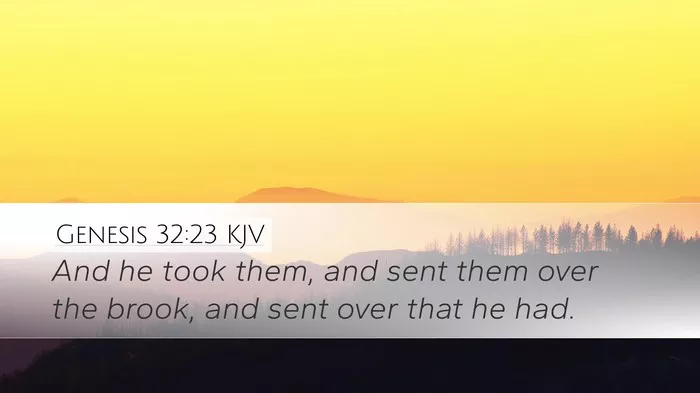Read the Daily Bible Verse – Genesis 32:23 To Strengthen Your Spiritual Journey.
The Context on Genesis 32:23 KJV
Genesis 32:23 is part of a significant episode in the life of Jacob, situated within his journey back to Canaan after years of living away. This journey brings Jacob back to his family land but also to confront his past, including the difficult relationship with his brother, Esau. Jacob, who has gained wealth and family, faces an internal struggle between the life he has led, marked by manipulation and fear, and the future God has in store for him. Jacob, seeking protection and resolution, strategically divides his people and resources, sending them across the river Jabbok.
In Genesis 32:23, we read:
“And he took them, and sent them over the brook, and sent over that he had.” (KJV)
This verse introduces a moment of significant transition, both physically and spiritually. Jacob has sent his wives, children, and possessions ahead of him, making a deliberate decision to separate from them temporarily. Here, he prepares for an encounter with God that will forever change his identity and place in biblical history. This moment is a prelude to Jacob’s encounter with God, setting the stage for a profound transformation.
The Genesis 32:23 Meaning
Genesis 32:23 underscores a symbolic and physical separation, where Jacob removes his loved ones and belongings from his immediate presence. In ancient Near Eastern culture, the crossing of a river often symbolized a boundary or significant life change, and here Jacob faces the prospect of both danger and divine intervention. By moving his family and possessions across, Jacob signifies his readiness to confront something deeply personal, separating himself from all that represents his past life of worldly attachments and protective strategies.
This verse also reflects Jacob’s preparation to be alone, to wrestle with the “angel of the Lord,” representing a time of soul-searching, struggle, and eventual surrender to God. He is left with no distractions, a moment of vulnerability and clarity that becomes essential for the transformation that follows.
Genesis 32:23 Application in Life
Genesis 32:23 highlights the importance of detachment and preparation in moments of life’s most significant transformations. It demonstrates that in times of transition, letting go—even temporarily—of people or things we cherish can prepare us to receive a higher purpose or blessing. Jacob’s act of separation teaches us about the value of stepping back from worldly attachments and creating space to encounter God.
This passage offers a reminder that times of solitude or separation can lead to spiritual growth. Just as Jacob prepared himself for an encounter with God, we can apply this principle by dedicating time to prayer, meditation, or personal reflection. Creating “spaces” in our lives can allow us to hear God more clearly, especially in times when we face challenges or need clarity.
Comparison with Other Biblical Texts
Genesis 32:23 aligns with other biblical narratives where separation or detachment precedes divine encounters or blessings.
Moses on Mount Sinai (Exodus 19): Moses ascends alone, leaving the people below to meet with God on Mount Sinai. Like Jacob, Moses undergoes a physical separation that prepares him to receive God’s commandments, highlighting the theme of isolation in preparation for spiritual encounters.
Jesus’ Wilderness Experience (Matthew 4:1-11): Jesus, before beginning His ministry, spends 40 days in the wilderness, separated from all earthly attachments. His time alone strengthens Him and prepares Him for the challenges ahead, echoing Jacob’s period of solitude.
Paul’s Time in Arabia (Galatians 1:17): After his conversion, Paul retreats to Arabia for a period of separation and learning. Like Jacob, Paul’s period of isolation precedes a significant ministry and transformation, signifying the importance of “wilderness moments” in the life of faith.
These instances emphasize how physical separation and solitude are frequently essential to receiving God’s guidance or blessings. In all these cases, individuals emerge with a deeper understanding of their purpose and role in God’s plan.
Modern-Day Relevance
Genesis 32:23 speaks to modern readers about the need for personal space and time away from the daily busyness and distractions. In today’s fast-paced world, moments of separation and solitude can be rare but are crucial for spiritual renewal. This passage suggests that stepping away from routine distractions, even temporarily, allows for profound reflection and alignment with God’s will.
For modern-day believers, Jacob’s preparation at the river Jabbok can encourage practices like retreats, quiet reflection, or fasting as ways to prepare for moments of insight or transformation. Genesis 32:23 reminds us that seeking God often requires conscious effort to make space, helping believers draw nearer to God during life’s pivotal transitions.
Conclusion
Genesis 32:23 introduces a key moment of preparation in Jacob’s journey, as he separates from his family and belongings to face a significant encounter with God. This verse invites us to consider the spiritual importance of solitude and preparation. By willingly letting go of worldly attachments, Jacob prepares himself for a new identity and deeper relationship with God.
This passage encourages believers to embrace moments of separation and solitude, recognizing them as valuable steps toward spiritual growth. In creating space for God, we too may experience transformation, just as Jacob did, stepping into a new identity and purpose.
Genesis 32:23 Commentary
The commentaries on Genesis 32:23 often highlight Jacob’s solitude as essential to his transformation. Commentators note that Jacob’s choice to send everyone ahead signals his readiness for God’s intervention and marks his departure from his past life of self-reliance. The “sending over” of his family and possessions can be viewed as a symbolic act of letting go, making space for his encounter with God and symbolizing a break from his past.
This verse invites reflection on how, like Jacob, moments of surrender and solitude can prepare us for new blessings and responsibilities. Commentators see Jacob’s crossing of the Jabbok as an act of humility, showing us that surrender is often the key to receiving God’s grace and favor.
Related topics:

